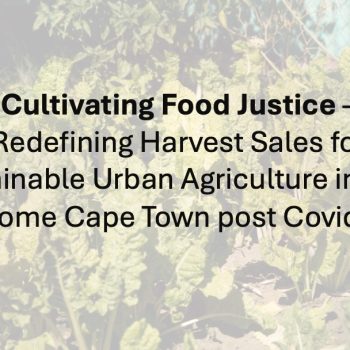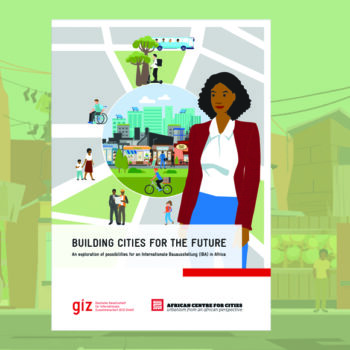Exploratory Process into the Relevance of an Internationale Bauausstellung (IBA) for Cape Town
To date strategies and plans for sustainable urban growth and renewal in South Africa seem to fall short of achieving the requisite socio-spatial and economic justice. Cape Town is exemplary of the seeming intractability of this issue and begs for alternative and innovative approaches to unlock the design potential latent in the Built Environment Performance Plan of the City of Cape Town.
This exploratory process, led by the African Centre for Cities (UCT) in partnership with Deutsche Gesellschaft für Internationale Zusammenarbeit (GIZ) brings to together key stakeholders to consider the potential adaptation of the methodology called Internationale Bauausstellung (German for International Building Exhibition) or IBA for short, in the context of Cape Town.
GIZ is keen to explore whether the IBA methodology could have relevance and provide a platform for innovation in an African urban context. They are collaborating with ACC to drive this exploration in Cape Town, and with LSE Cities in Addis Ababa, Ghana.
WHAT IS IBA?
Germany has achieved considerable success over an extended period of time with targeted urban growth and renewal that revitalises place, strengthen cross-class social solidarity, advance innovative architectural expression and catalyse economic development, through the IBA methodology.
An IBA creates an extraordinary environment for new modes of planning and building culture and have an impact that exceeds far beyond their local boundaries. Within a project period of 6-10 years, IBAs seek forward-looking and sustainable spatial answers in architecture and urban development in times of pressing, economic, social, ecological and spatial transformation. Under a specific guiding question/theme, IBAs explore and experiment with new forms of stakeholder collaboration, governance and modalities for implementation, while focusing on a specific urban district, city or region.
Typically, a set of concrete projects with a lighthouse character (an exemplary beacon) are developed and implemented based on the mobilisation of local and international expertise. The results of an IBA, mostly visible projects within a designated part of the city, are presented to an international audience during and at the end of its term; hence the exhibition component of the work. In the German experience, this exposure makes the IBA widely accessible, ensures the scaling of success stories and serves as locational advantage for the city or region in its aftermath.
One of the distinctive features of the IBA methodology is that it is able to induce innovation in rigid institutional settings because it is mandated to experiment with new modes of implementation and financing. On the back of early visibility, broad-based buy-in and success, it can leverage inventive urban projects with long-term impacts.
PROJECT PROCESS
In Cape Town the IBA approach may generate solutions in relation to the broad range of issues associated with sustainable urban development, including addressing spatial inequality, the growing need for affordable housing, managing informality in housing and trading, providing sustainable measures of urban development that allows for inclusive economic opportunities as well as mitigating and adapting to climate change.
In light of this, ACC will convene a series of workshops starting 7 September 2021 to discuss the components of the IBA concept set against an exploration of targeted urban renewal in South Africa and Cape Town. Workshop participants will include representatives from local and provincial government, built environment professionals, property developers, including UCT, civil society and community organisations. IBA experts from Germany will provide information on the IBA approach and exchange ideas about the potential for translation and adaptation into the South African context.
The final workshop will be concluding a collaborative meeting in the end of November where recommendations will be tabled on if, and how, an IBA process could be deployed in Cape Town, using the Ndabeni Triangle area as an example.
CONTACT
For more information contact project coordinator Vanessa September
RESOURCES
GENERAL FACT SHEET: What is an international Building Exhibition (IBA)? What can it achieve?
PROJECT FACT SHEET: International Building Exhibition Africa




